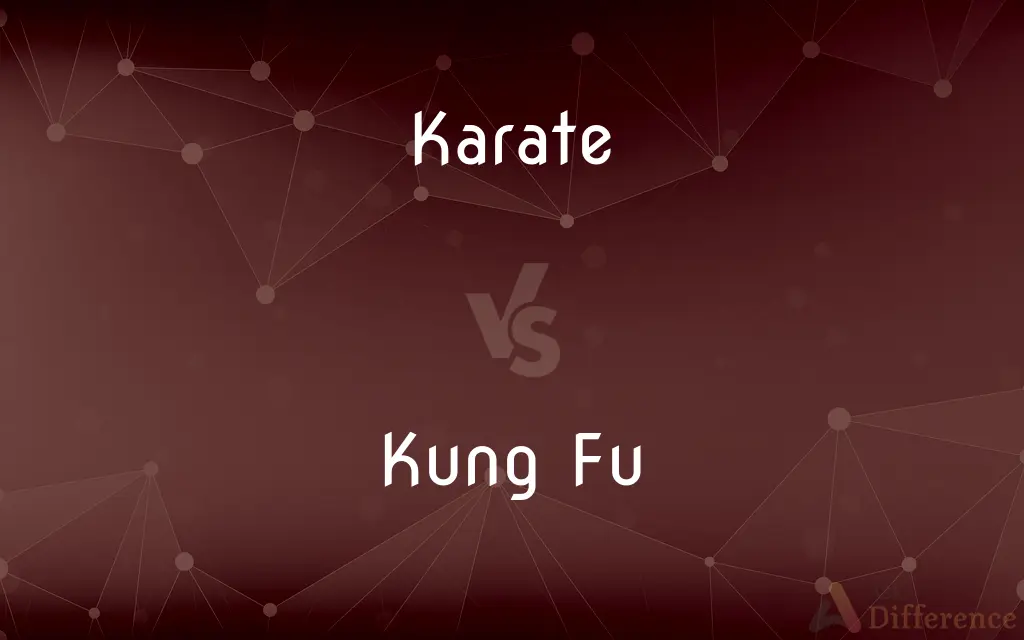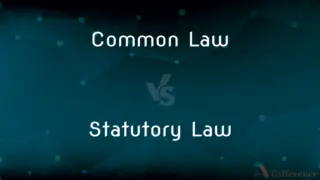Karate vs. Kung Fu — What's the Difference?
By Tayyaba Rehman — Published on October 17, 2023
Karate originates from Japan, focusing on linear movements and punches, while Kung Fu, from China, encompasses a range of martial arts with fluid and circular movements.

Difference Between Karate and Kung Fu
Table of Contents
ADVERTISEMENT
Key Differences
Karate and Kung Fu are both renowned martial arts but differ in origin, techniques, forms, and philosophies. Karate originated from Okinawa, Japan, emphasizing linear movements, striking techniques such as punching, kicking, knee strikes, and elbow strikes. In contrast, Kung Fu has its roots in China, embodying a variety of fighting styles, philosophies, and techniques, often characterized by fluid, circular movements.
Karate, often perceived as more straightforward and direct, emphasizes strength and power in its techniques. It primarily focuses on self-defense, with practitioners being trained to block attacks efficiently and respond with counterattacks. Conversely, Kung Fu is perceived as more diverse and intricate, emphasizing balance, stability, and the understanding of leveraging body mechanics, often involving a wider range of techniques, including grappling and throws.
The training and learning approach in Karate is typically systematic, with students learning a series of forms, or 'katas,' each with specific movements and techniques to master. In contrast, Kung Fu training is more versatile, with numerous styles each having unique forms, techniques, and training methods, often inspired by animal movements and Chinese philosophies.
The philosophies underlying Karate typically center around self-discipline, respect, and the ethical use of one’s skills. It encourages the development of character and emphasizes ‘spiritual’ training as much as physical. On the other hand, Kung Fu, with its myriad of styles, incorporates a broad spectrum of philosophies and principles, often intertwined with Taoist and Buddhist concepts, focusing on harmony, balance, and the cultivation of internal energy, or 'Qi.'
In essence, while Karate and Kung Fu may share the common goal of self-improvement and self-defense, the diversity in their techniques, philosophies, and training methodologies reflect the rich cultural and historical contexts from which they emerged, offering different paths for practitioners to explore and master.
ADVERTISEMENT
Comparison Chart
Origin
Japan
China
Techniques
Linear movements, striking techniques
Fluid, circular movements, diverse techniques
Training Approach
Systematic, focus on 'katas'
Versatile, varied across styles
Philosophical Underpinning
Self-discipline, respect, ethical use of skills
Harmony, balance, cultivation of 'Qi'
Characterization
More straightforward, direct
Diverse, intricate
Compare with Definitions
Karate
Emphasizes self-discipline, respect, and ethical use of one's skills.
Karate practitioners often exhibit high levels of discipline and respect.
Kung Fu
A Chinese martial art involving a variety of fighting styles and techniques.
Kung Fu is renowned for its fluid and intricate movements.
Karate
Known for its linear movements, such as punches and kicks.
Karate techniques often involve direct and powerful movements.
Kung Fu
Characterized by fluid, circular movements and diverse techniques.
Practicing Kung Fu requires mastering a range of diverse techniques.
Karate
A martial art developed in Okinawa, emphasizing striking techniques.
He practices Karate to enhance his self-defense skills.
Kung Fu
Often incorporates philosophies and principles from Taoism and Buddhism.
The philosophies in Kung Fu focus on harmony and the cultivation of internal energy.
Karate
Often involves the systematic learning of forms or 'katas.'
Mastery of Karate requires dedicated practice of various 'katas.'
Kung Fu
Emphasizes balance, stability, and understanding of body mechanics.
Kung Fu practitioners strive to achieve balance and leverage in their movements.
Karate
Focuses equally on spiritual and physical training.
Karate teaches the importance of balancing spiritual and physical development.
Kung Fu
Each style of Kung Fu has unique forms, techniques, and training methods.
The various styles of Kung Fu offer a rich diversity of forms and techniques to learn.
Karate
A Japanese martial art in which sharp blows and kicks are administered to pressure-sensitive points on the body of an opponent.
Kung Fu
Alternative spelling of kung fu
Karate
An Okinawan martial art involving primarily punching and kicking, but additionally, advanced throws, arm bars, grappling and all means of fighting.
Karate
To attack (somebody or something) with karate or similar techniques.
Karate
A traditional Japanese system of unarmed combat; sharp blows and kicks are given to pressure-sensitive points on the body of the opponent.
Karate
A traditional Japanese system of unarmed combat; sharp blows and kicks are given to pressure-sensitive points on the body of the opponent
Common Curiosities
What are the characteristic movements of Karate?
Karate is characterized by linear movements and striking techniques like punches and kicks.
What is the origin of Kung Fu?
Kung Fu originated in China.
How are the movements in Kung Fu usually characterized?
Kung Fu movements are characterized by being fluid, circular, and often intricate.
What does Karate training typically emphasize?
Karate training typically emphasizes self-discipline, respect, and the ethical use of one’s skills.
What philosophies are often intertwined with Kung Fu?
Kung Fu is often intertwined with Taoist and Buddhist philosophies, emphasizing harmony and balance.
Is Karate more focused or diverse in techniques?
Karate is more focused, often perceived as straightforward and direct.
Where did Karate originate?
Karate originated in Okinawa, Japan.
How diverse is Kung Fu in techniques and styles?
Kung Fu is highly diverse, encompassing a variety of styles, each with unique techniques.
Share Your Discovery

Previous Comparison
Bounteous vs. Bountiful
Next Comparison
Common Law vs. Statutory LawAuthor Spotlight
Written by
Tayyaba RehmanTayyaba Rehman is a distinguished writer, currently serving as a primary contributor to askdifference.com. As a researcher in semantics and etymology, Tayyaba's passion for the complexity of languages and their distinctions has found a perfect home on the platform. Tayyaba delves into the intricacies of language, distinguishing between commonly confused words and phrases, thereby providing clarity for readers worldwide.













































